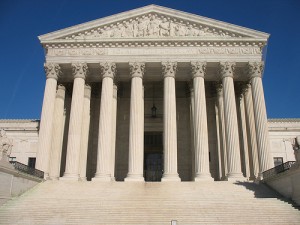Here are last week’s published decisions involving local governments:
First Circuit
- Town of Johnston v. Fed. Housing Finance Agency, No. 13-2034 (Aug. 27, 2014): The court affirmed the dismissal of the municipalities’ claim that Fannie Mae and Freddie Mac failed to pay taxes on property transfers; the court found that statutory exemptions from taxation applied. As the court put it: “Six other circuits have recently considered this attempt to shoe-horn a transfer tax into a real property tax, and they have unanimously rejected the argument.”
Second Circuit
- Holt v. Town of Stonington, No. 12-4878 (Aug. 29, 2014): The court found that plaintiff who challenged Town’s restrictions on her ability to build on her property failed to exhaust administrative remedies as required by Connecticut law.
Third Circuit Continue reading



